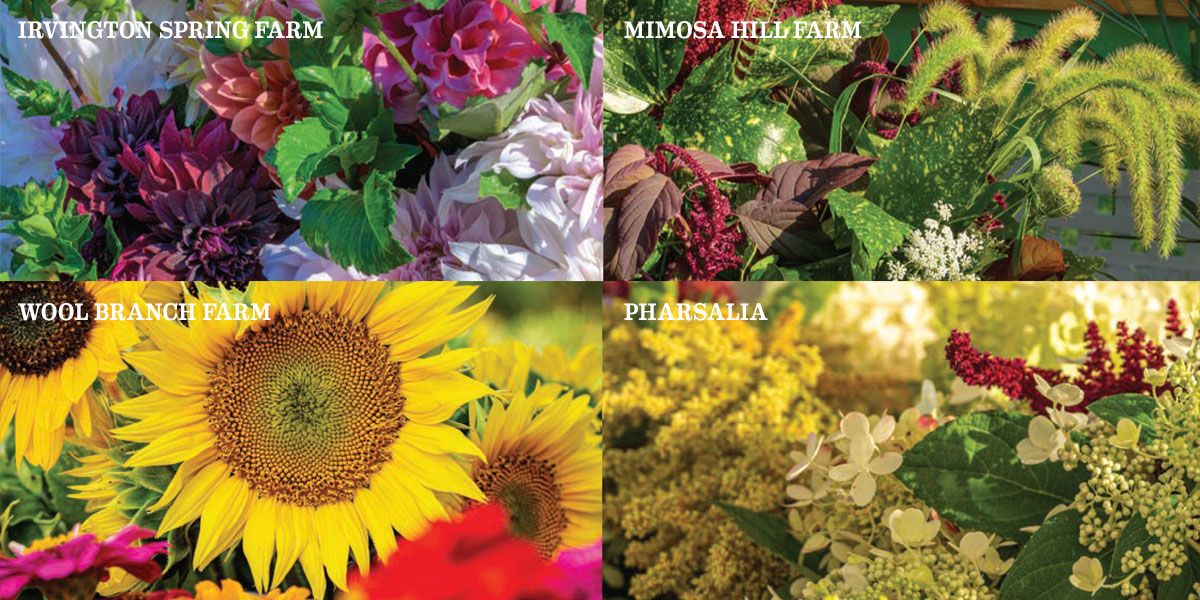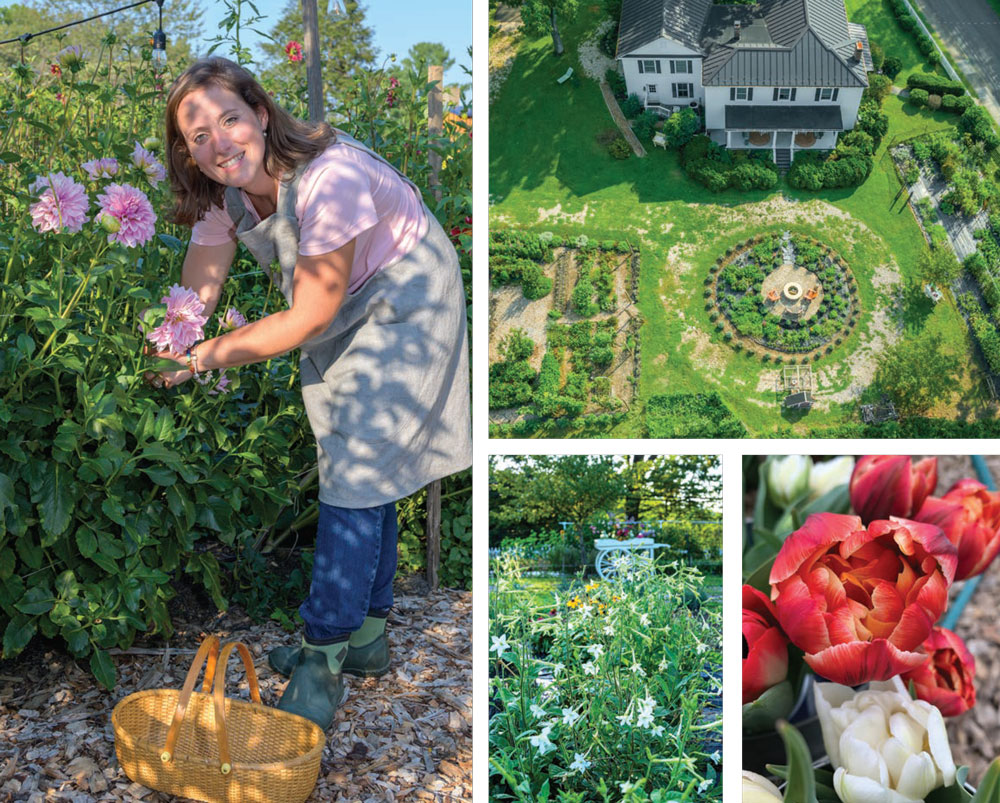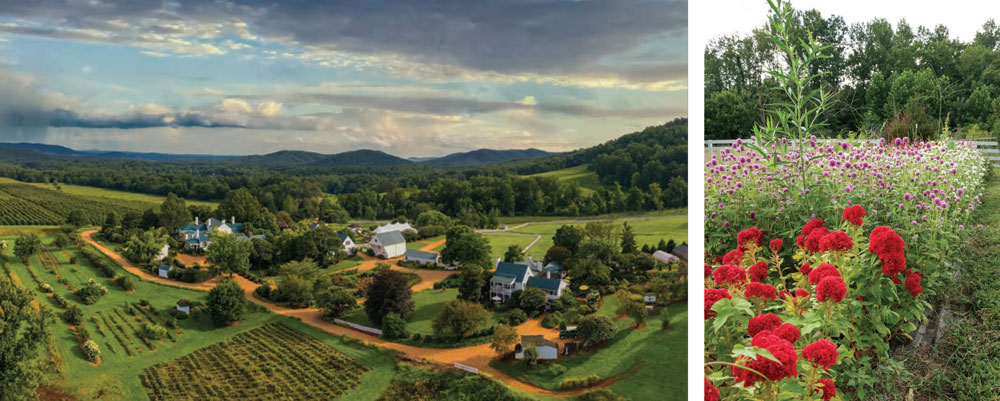Riots of Beauty | Area Flower Farms Offer an Abundance of Blooms

It is as if Ralph Waldo Emerson had a vision of spring in Central Virginia when he penned the line “the Earth laughs in flowers.” There is a sense of glee after a stark, leafless winter when the vibrant green of the grass juxtaposes with fuchsia blooms of redbuds, the delicate pink of dogwoods, and the sunny daffodils peeking through the dirt.
We are fortunate that our area has the right climate for so many varieties of flowers to thrive. Here, we learn about four area flower farms and their owners who not only celebrate nature’s beauty, but cultivate it, bloom by bloom, with thought, determination and dedication. Each farm has its own story, its own personality and are handled with care thanks to services like those commercial landscaping services online. All create delight, and, in these tumultuous times, a sense of peace. Each applaud Lady Bird Johnson’s declaration: “Whenever flowers bloom, so does hope.”
Kaye Moomaw has been working the land of IRVINGTON SPRING FARM alongside her husband, Ben, for decades. They understand the cycles of time and life, signaled by what is blooming or what work is yet to be done. They understand the need to mark important life events with flowers, and also, sometimes, the need to create celebrations for nothing particularly special at all.
“We started selling flowers when we lived in Charlotte,” Moomaw says, “and when we came back here, we knew it was something we wanted to continue.”
Although the land had been in Ben’s family for generations, they were the first to really farm it. Now, there are three acres of cut flowers and two “high tunnels” (think: greenhouses), which offer a different climate for growing flowers that might not survive in the field.
The family has cultivated more than 70 varieties of flowers; all but a handful have limited availability—typically several weeks. They are also avid rosarians, and have created both propagation and cultivation areas for roses, as well planting dozens of varieties.
What’s grown is available for wholesale, to designers and florists like the San Marcos florist for special events (including weddings), and, for nonprofessionals, there is an onsite flower cooler that offers flowers by the bunch, mixed bouquets, and Mason jar arrangements; their blooms can also be found at the Lynchburg Community Market.
“Having a cutting garden is work every day. It doesn’t have to consume you, but you end up serving the garden,” Moomaw says. “We’ve been doing this for so long, it’s a way of life.”
That commitment has made the Moomaws aware of the interconnectedness of all living things, and has sparked a desire to implement positive changes in their corner of the world. They are committed to decreasing the use of pesticides and other chemicals, and planting and selling pollinator plants.
“We want to do more than simply say we love the butterflies and honey bees; we want to give the earth back to them. Without pollinators, we wouldn’t survive as a farm or a planet. In addition to being a certified pollinator habitat, we’re working on ever-increasing sustainability methods,” she says.
Another way to do that, says Moomaw, is to focus a bit more on some native species, which require less to thrive. “Gardening teaches hope, patience. It takes a long time. Be gentle with yourself and your plants. There is a lot to learn, and to learn, you have to deal with failures.”
They are passionate about caring for the land, coaxing beauty from it, and sharing that bounty with others. Especially after the pandemic hit, Moomaw thought it was important to give people in the community a place to come for tranquility and beauty, so while everyone is welcome to shop (using the honor system), people may also come to just enjoy a picnic.
“When [coronavirus] first came out, things were deathly quiet here,” says Moomaw. “Slowly but surely, people started coming out, then it was in droves.”
Some customers paid extra, she says, and some wrote touching entries in the notebook the farm provides for customers to record purchases.
“There was a tremendous outpouring of support,” Moomaw says. “It was huge, so affirming.”
As the plantings and other offerings evolve, so too, does the business. The Moomaws have handed over the management of the farm to their daughter Maggie, and have also recently opened their large farmhouse (where Moomaw and husband Ben continue to live) and its adjacent buildings as AirBnB offerings; that business is managed by daughter Mary Ellen LaFreniere.
“It’s a lifestyle,” Moomaw says. “We love to do this—thankfully, my husband loves it too. I’ve been selling so much around town, some people call me ‘The Flower Lady.’ I love it.”
Kathryn Hansen, who started MIMOSA HILL FARM with her husband Billy last year, is just as surprised as passersby that they created an urban garden in the middle of a pandemic. “I had no idea how much I loved flowers until I started growing them,” she says.
Although toiling in the soil is nothing new to her—she grew up helping her grandfather plant vegetables in his “garden” (a bona fide pumpkin farm), and her family grew Christmas trees—she could never imagine gardening leading to a career.
What she could envision in 2015, when she and Billy purchased their 1902 farmhouse on four acres, was that the space could become a place to bring people together.
Several years ago, she cleared some land and planted a circular garden around a firepit. Her two children each staked a claim. Then, after going apple picking one fall, came the purchase of a few fruit trees. And that lead to a vegetable garden. Hansen committed herself to bio-intensive practices, which, in layman’s terms, uses organic methods to get maximum results from a small space by putting companion plants together—for example, tarragon and eggplant, or beans and beets, increasing biodiversity and helping the soil stay fertile. Fences her husband made help keep out deer; to date, she has not had too many problems with other critters. She credits a homemade, organic “compost tea” for helping her plants thrive: “The healthier the plant, the harder it is for pests to damage it,” she says.
And as the pandemic began in 2020, Hansen was harvesting her first flowers: tulips, 750 huge tulips. Then came the planting of dahlias: 99 from seed. And eventually, a 70-foot-long bed with dozens of varieties of flowers.
“Every time I plant something, I get so excited,” Hansen says. She credits the Floret Online Workshop, created by renowned farmer-florist Erin Benzakein, for minimizing mistakes, and follows a biodynamic sowing and planting calendar, calling on family to help.
“My grandfather farmed and now his son, my uncle Jack Evans, and his wife Pam, have a farm in Appomattox, Rocky Top Farm, that we visit often. They also practice organic/sustainable farming, and sold vegetables and flowers at the Lynchburg Community market for years. They are my ‘call a farmer hotline’ with any growing questions I have. It’s truly a blessing to have someone that’s been growing for years to call,” she says.
Eventually, there was more produce (and flowers) than the family and neighbors could consume. And a hobby became a business.
Hansen’s dad built the farm stand and table that offers the farm’s daily harvest. At first, offerings were put out on Saturdays. As the gardens began thriving, every day brought something new. “I mentioned to him we needed a covered stand to put our flowers in and he had a wonderful vision for it,” Hansen says. “The wood for the table is from the old pine window frames he salvaged from our farmhouse renovation last summer. I’m so grateful for him building a beautiful little stand to sell our flowers and vegetables!”
In addition to selling produce and precut floral arrangements in varying sizes, Mimosa Hill offers “smell and taste tours,” flower bars featuring cutting/ arranging, various flower subscriptions, and other ways to take advantage of all that the farm produces, including farmhouse dinners, a variety of herbs, bundles of lavender and eucalyptus, and even some oils.
“We’ll do this as long as we can; that’s the plan,” Hansen says. “I think, even if you don’t have a big garden space, connecting back to nature is so important.”
Amy and Adam Bigham are rooted in Central Virginia. Literally and figuratively. Both life-long residents of the area, she works as a library assistant at Concord Elementary School, and he is a Realtor. Since getting married in June 2007, they have had two children (Eli and Emi), purchased 10 acres, and founded WOOL BRANCH FARM.
“We had this open field sitting behind us,” says Amy Bigham, “and we were trying to think of something that may be profitable so I said ‘What about flowers?’ The year before we planted rows of sunflowers and they did great. I didn’t sell them but they made for such pretty and fun photography.” Husband Adam was on board, so they ordered and planted a variety of seeds, including sunflowers, zinnia, cosmos, gladiolus, sweet pea, dahlias, lavender, limelight hydrangea, sedum, and various herbs, including mint, oregano, rosemary, spearmint, and lemon balm.
There was a lot of trial and error; some they tried to grow in flats and others were directly sown. “Some flowers came up and some didn’t, but we knew there would be a chance of that,” Bigham says. “Luckily our flowers that did well were bountiful.”
While some growers are hesitant to select a favorite, Bigham says sunflowers top her list: “They’re just so beautiful and vibrant! I have to share a quote, by Helen Keller: ‘Keep your face to the sunshine and you cannot see shadows, it’s what the sunflowers do!’”
Bigham finds inspiration and helpful information from the book “The Flower Farmer” by Lynn Byczynski, and from social media, especially Brownings Farm and Flower Truck, and Blooming Joy Flower Farm.
“They have helped give me the determination and motivation that I need day in and day out. I don’t teach classes or anything like that yet, but I’m hoping by gaining more knowledge and experience with flowers I’ll have the confidence to do so. I would love to have a cut flower field or offer bouquet making classes/events.”
The farm’s flower cart, she says, was one of those things “that just sort of happened.”
“July (2020) rolled around and Adam said, ‘We have got to do something with all these flowers,” Bigham says, which lead to the cart. Adam had purchased the old GMC truck bed, which serves as the base for the cart, on Craigslist a while ago. He wasn’t sure what would become of it, but felt he couldn’t pass on the vintage piece.
“I had been following other flower carts and thought we could totally do the same with this old truck bed,” Bigham says. “Adam added the roof, side ledges, and the racks for galvanized flower buckets. It was perfect.”
The couple posted pictures on social media, made about 30 bouquets, filled a few extra buckets with individual stems and fillers, and let folks know they would debut the full cart the following morning.
“We set up in a vacant parking lot right beside Concord School, and much to our surprise, we sold out of flowers in under 30 minutes,” Bigham says. “We were blown away by the love and support of our community. It was wonderful to see the joy that these flowers and this little cart was bringing. It had been a hard year for many; having something as simple as fresh, local flowers bring smiles and happiness was such a blessing. From this point on I knew this is what I wanted to be doing with my life. This flower journey has been a crazy, beautiful one and I wouldn’t trade it for anything.”
When Foxie Morgan tells the story of PHARSALIA, her Nelson County flower farm and event space, it’s part nostalgia for the past, part looking toward the future, and, ultimately, a love story.
The plantation home was built in 1814 as a wedding present for William Massie, one of Morgan’s ancestors. Now, 200+ years and five generations later, Pharsalia is a breathtaking 20 acres overlooking the Blue Ridge Mountains that is listed on both the National Registry of Historic Places and the Virginia Landmarks Register.
For Morgan, who is a direct descendant of William Massie’s youngest son (Bland Massie), Pharsalia (along with its flowers, fruits, and vegetables) is as much a part of her life as breathing.
“We are definitely connected to this place—dangerously so,” she says, explaining that as a child, she would spend weekends and summers on the property. In 1974, when she married her husband, Richard Morgan, they moved into what was once the caretaker’s house. “My heart and soul are here.”
Pharsalia remains a private residence and a working farm; it is open to the public by appointment, for events, and for farm-sponsored classes.
“We have hosted flower classes on ‘how to,’ including seed starting, arranging, gathering and foraging, et cetera, to classes on antiques, apples, ticks and grilling,” says Morgan. “Our spring flower classes may instruct all about peonies, planting dahlias or harvesting the many hydrangeas on the property. Fall classes are about foraging the grounds and using the unexpected—like gingko leaves, chestnut pods or paradise tree pods in your arrangement—and of course, cutting fall flowers, including dahlias. Dried flower classes are popular too, using what we harvest here.”
Morgan grows about 200 varieties of annuals and perennials, mainly for cutting; her biggest crop is peonies, which she admits are her favorite perennial. She has about 1,700 peony plants, and, at the height of the season, she is cutting them four or five times a day.
“Flowers are my passion. It’s a feel-good product that changes monthly. I’m lucky to have found one,” she says. “It grew; it didn’t happen all at once.”
Her mother always encouraged her to have a little garden, and she did. But, she also taught elementary school and was busy raising her three now-grown children.
With fewer family obligations, she’s been able to nurture her passion, with trips near and far, a membership to the National Association of Specialty Cut Flower Growers, and evenings to sit with stacks of beautiful, informational books.
When arranging, she says, “I’m not afraid anymore: If I like it, that’s all that matters.” She enjoys adding unexpected items from foraging: the long frill of chestnut tree blooms, stems with not-quite-ripe blueberries, tiny crab apples, poppy pods, even figs on stems.
Cut flowers are for sale to wholesalers, for events on the property—mostly weddings—and can be purchased seasonally (along with produce) at the Nelson County Farmer’s Market in Nellysford, which Morgan has been regularly going to since it opened in the mid 1990s.
“The Market is a way that I can market Pharsalia, and also being able to sell there helps me pay for my help. It’s all a cycle,” she says.
Morgan enjoys meeting and talking with other growers: sharing and sometimes trading varieties, learning best practices, pushing for fewer pesticides and more pollinators and more native species. “There’s always some competition,” she says, “but it’s not cut-throat. … You can learn so much from others.”
For now, she is happy to see couples exchanging vows, continuing the love story.
“There are three things I love about my job: I can go to work in my pajamas; my employees are the very best—I would be nothing without them; and my husband, who is willing to help—being the chief grass cutter takes days—and he never stops or sits down. He’s always rearranging and coming up with new ideas.” ✦
annuals, Blooms, bouquets, cultivation, Cut Flower, cutting garden, Flower Farms, flowers, fruits, gardening, greenhouses, native species, Perennials, pollinator plants, precut floral arrangements, produce, propagation, sunflowers, vegetables














